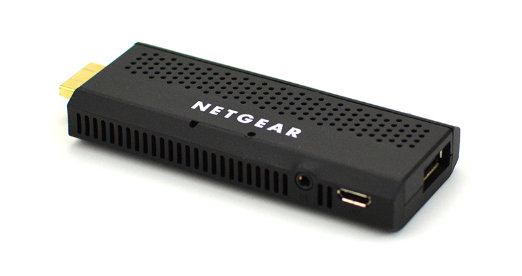NETGEAR has announced a new HDMI dongle called NeoMediacast, but also known as NTV300D model, running Android 4.2.2, with functionalities very similar to all the HDMI TV sticks / mini PCs originating from Chinese manufacturers we’ve seen for nearly 2 years. AFAIK, NETGEAR is the first relatively well-known global company to unveil an Android HDMI TV stick for the consumer market. [Update: see comments for details how it will reach the comsumer] Key features published for NTV300D by the company:
Key features published for NTV300D by the company:
- Android 4.2+ supported with RDK support in the future
- 1080p/60 full HD, H.264/MPEG4 video decode
- Supports HDMI 1.4 and HDCP 2.1
- Miracast-enabled
- Wi-Fi 802.11ac 1×1 AC 450 Mbps, Bluetooth 4.0
- USB powered
- Micro SD slot for playback/storage
- Micro USB (OTG) for secondary storage
- Misc – Infrared Port, status LED
- DRM support for Microsoft PlayReady, Google Widevine and Adobe RTMPe
- Remote control unit – RF4CE or Bluetooth supported
So there’s now information about the SoC and/or memory usage. Albeit it looks very much like Geniatech ATV120, powered by AMLogic AML8726-MX dual core ARM Cortex A9 SoC, the hardware must be different because it supports Bluetooth 4.0 and 802.11ac. I haven’t seen the later any other mini PCs in dongle form factor.
The company has also designed their own user’s interface, and added DRM support to the firmware.

The device will be sold with a USB Cable, an HDMI Cable, a Remote unit, and an IR blaster cable once it becomes available in Q2 2014. Further details may vbe available in NETGEAR NeoMediacast page.

Jean-Luc started CNX Software in 2010 as a part-time endeavor, before quitting his job as a software engineering manager, and starting to write daily news, and reviews full time later in 2011.
Support CNX Software! Donate via cryptocurrencies, become a Patron on Patreon, or purchase goods on Amazon or Aliexpress





I met with Netgear at CES, and this model is NOT going to be available in retail. It will be sold to service providers (like AT&T / Comcast in the US). Also, this model will be bundled with a home gateway (which will have a hard disk — functionality very similar to that of a DVR). The hope is that, in the future, service providers will be able to give consumers multi-room functionality by having a DVR in a central location that doesn’t necessarily need to be connected to the primary TV. In addition to the NTV300D, a NTV300M was… Read more »
To get 802.11ac you need either USB 3.0 or PCIe. Since there are no USB 3.0 ports PCIe is most likely. Freescale iMX6 has PCIe.
@Jon Smirl
It could also be one of Qualcomm or Broadcom SoCs that integrates 802.11ac.
Looks like they use the same UI as the AMLogic M802-based Geniatech ATV1800: https://www.youtube.com/watch?v=_ZqJomOVFr0
Do you guys know what the launcher is?
I think it’s called something like Win8 UI.
Isn’t that recently introduced “Geniatech Metro Launcher”? Can anybody with ATV1200, ATV120 etc. tell me what it looks like? It was introduced to Genitech’s Android images in August last year.
From
http://www.netgear.com/service-providers/products/connected-media/set-top-boxes/NTV300D.aspx
“Packing the features of a high-end set-top box, the NTV300D allows service providers to develop and operate a curated content store leveraging the integrated Android SDK technology. By allowing for seamless portability of existing Android applications, or cost-effectively developing new applications, the NTV300D ensures a complete media streaming solution for accessing both premium and free Over-the-Top (OTT) content.”
What is Over-the-Top (OTT) content???
@onebir OTT may be what the original Google TV did. It had HDMI in and HDMI out. So it was able to overlay apps onto a corner of the screen while watching live TV. You could be watching a live show and have an active Twitter window in part of the screen.
Almost all cable boxes do this. When I access the program guide on my cable box the live TV is still shown in a small inset window.
@onebir
Yes, Over-the-Top is when you combine a TV channel with data from the Internet of other sources overlaid on top of the video.
@Jon Smirl @Jean-Luc Aufranc (CNXSoft) Thanks – thought it might be a mistranslation or Chinese neologism :p